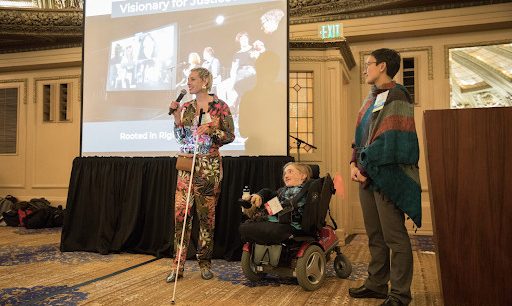Electronic Visit Verification: a Threat to Independence for Disabled People
Dennis Borel of the Texas Coalition of People with Disabilities sums up Electronic Visit Verification (EVV) in one crisp comment: “What am I, a felon? Put an ankle bracelet on me.”
If you’re not familiar with EVV, it involves the use of an electronic system to record hours worked by personal care attendants and certain other home services providers for older adults and the disability community. This may involve a purpose-built device, a phone application, or a web-based input form that can be accessed on a computer. With EVV, when people log hours, their employers must verify them at the time and location of service.
While many members of the disability community are gravely concerned about the rollout of EVV, it’s an issue that hasn’t captured popular attention, much to the frustration of advocates working on the issue. Many see it as a significant threat to autonomy and another example of the government’s war on the disability community.
EVV proponents claim this will reduce fraud by confirming that people actually worked the hours they say they worked. “You’re putting in a technological solution that they’re not asking for, for a problem that doesn’t exist,” says Borel. Anti-EVV campaigners say there’s no strong evidence for fraud in these settings, and that the cost of EVV far overrides any potential fraud-related savings. Fraud is more commonly the result of bad billing practices at agencies, not a consumer-level issue.
Many people are happy with paper or online timecards, which they say are accessible and work well; and as the ones receiving services, they have no incentive to collude with providers to lie about the hours of care provided, as they’d only be defrauding themselves.
Robin Bolduc, a Colorado woman who provides attendant care for her husband, puts it bluntly: “EVV doesn’t address fraud or quality of services. A ton of money will go to the EVV vendors,” who just happened to spend a lot of money lobbying for EVV.
There are a lot of problems with EVV that have disabled people raising concerns. One is the rigidity of the system, which in some cases could require people to wake up in the middle of the night to sign off on hours. For others, people who perform multiple kinds of services may struggle to classify them. What happens when someone walks into the house, helps someone with toileting, washes some dishes, and then preps some medication? These may be classified as different services, and have to be logged independently. Problems with logging services accurately are a big concern, says Borel, who notes that it’s already hard to find qualified workers and worries EVV may be a deterrence.
But the big thing about EVV that’s causing alarm is the use of GPS tracking and in some cases cameras and microphones, especially in Ohio, which has rolled out what Kendra Scalia of Stop EVV describes as the “most onerous” version of EVV (the state claims cameras on the devices have been disabled). GPS tracking tells the government where services are delivered…but it also tells the government where disabled people are going. EVV data can show where disabled people go to church, school, or shop, and this compromise of privacy extends to family too — Melissa Milinovich, another Ohio consumer, has a young daughter and EVV will allow people to effectively track her child.
These factors, critics say, may force disabled people back into institutional settings. Some are opposed to what feels like a profound privacy violation and/or worried about being unable to find providers who are willing to work with EVV. If they don’t have private funds to pay for care, an option not available to many disabled people, they may be stuck in nursing homes.
Before you blame the current administration, you should know EVV was baked into a law from the previous administration, the 21st Century Cures Act, signed in December 2016. A mandate for EVV was slipped in at the last minute, and while the logistics are vague, the requirements are clear: States must implement EVV for people receiving personal care services by January 1, 2019, and for Home and Community-Based Services clients by January 1, 2023.
That combination of vagueness and rapidly-approaching deadline is a big problem, according to Bolduc. While she feels the state of Colorado has done an excellent job with soliciting stakeholder input and communicating with the disability community, the feds are still stonewalling the state, she claims, making it hard to move forward.
A bill that just went to the president for signature would slow the rollout, providing more time to develop effective EVV options that also respect privacy. And a recent Supreme Court decision, Carpenter v United States, is being viewed with optimism, because it affirms the right to privacy, an issue at the core of the EVV debate.
Disability activists who want to get involved with EVV issues in their states may want to start with Stop EVV, a nationwide advocacy group. Individual state disability rights groups are also providing outreach, education, and policy advocacy.
Without engagement from the disability community, EVV — and all the accompanying problems — may be unstoppable. Those who don’t use consumer-directed care services currently should work in solidarity with their fellow disabled people on this issue, and not just because their circumstances could someday change. An attack on the privacy and autonomy of one corner of our community is an attack on us all.
About Rooted In Rights
Rooted in Rights exists to amplify the perspectives of the disability community. Blog posts and storyteller videos that we publish and content we re-share on social media do not necessarily reflect the opinions or values of Rooted in Rights nor indicate an endorsement of a program or service by Rooted in Rights. We respect and aim to reflect the diversity of opinions and experiences of the disability community. Rooted in Rights seeks to highlight discussions, not direct them. Learn more about Rooted In Rights



